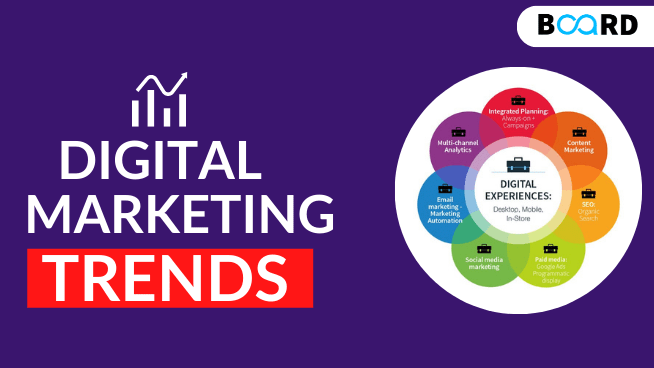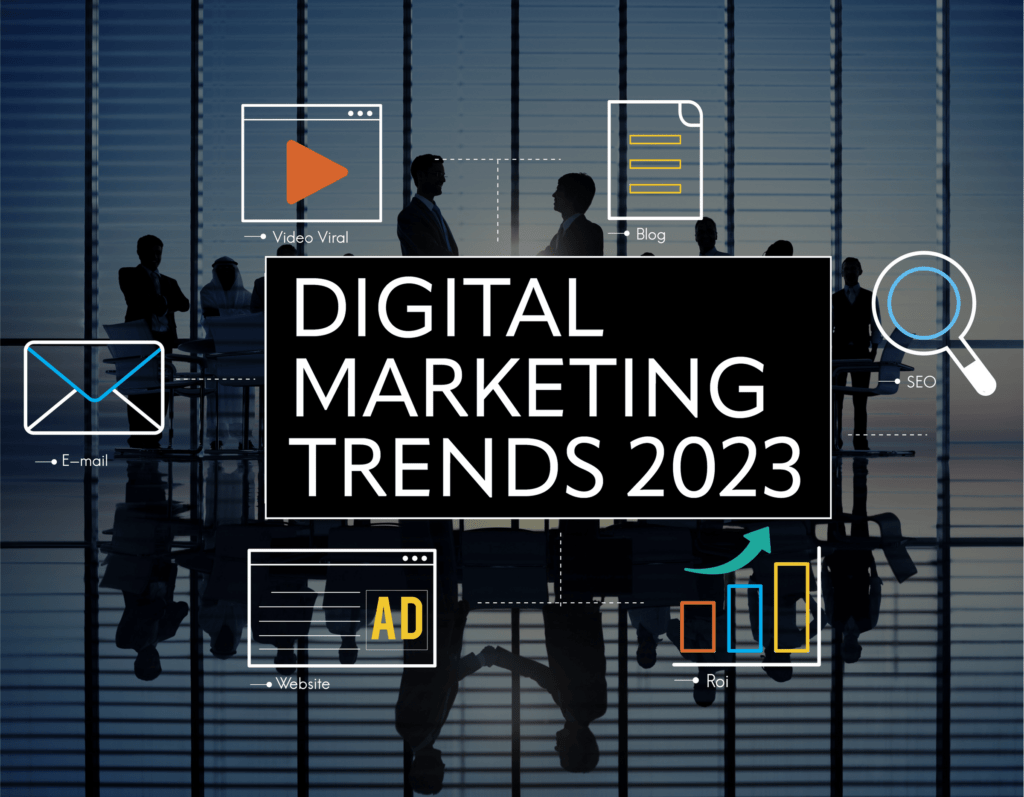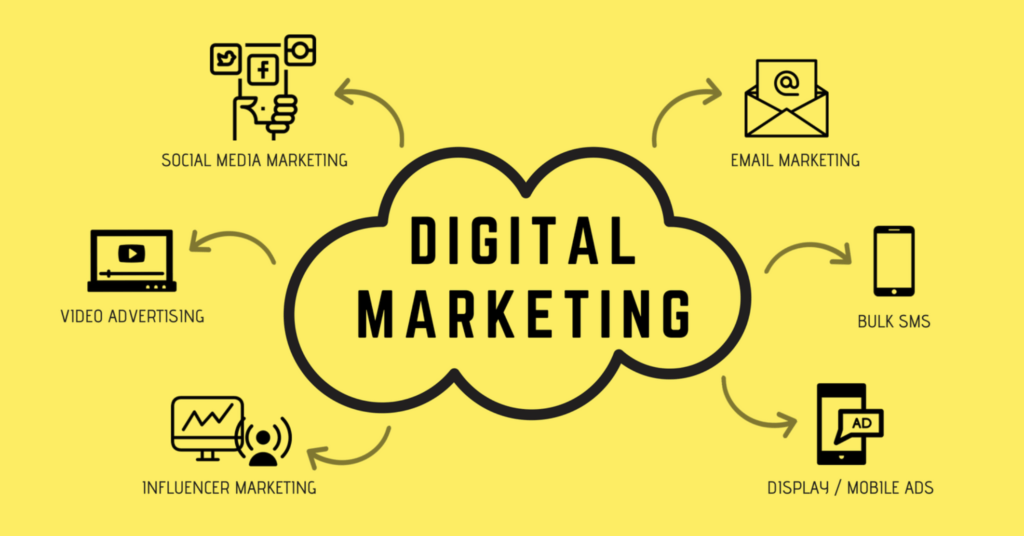Exploring the Ever-Evolving Landscape of Digital Marketing Trends
Digital Marketing Trends In the fast-paced realm of digital marketing, staying abreast of the latest trends is key to staying ahead of the competition. The industry’s landscape is in a perpetual state of flux, propelled by technological advancements, shifting consumer behaviors, and innovative strategies. Let’s delve into some of the most influential and transformative digital marketing trends shaping the current and future landscape.

**1. Video Marketing Dominance
The Rise of Video Content: Video marketing continues its ascent as one of the most potent tools for engagement and conversion. Platforms like YouTube, TikTok, and Instagram Reels are witnessing unprecedented growth, making video content an indispensable part of any digital marketing strategy. Brands are leveraging short-form videos, live streams, and interactive content to captivate audiences and drive brand awareness.
Live Streaming and Interactive Experiences: Real-time engagement through live streaming events, Q&A sessions, and interactive polls fosters a sense of community and authenticity, strengthening brand-consumer relationships.
**2. AI-Powered Marketing
Personalization and Customer Experience Enhancement: Artificial Intelligence (AI) is revolutionizing digital marketing by enabling hyper-personalization. AI algorithms analyze vast amounts of data to deliver tailor-made experiences, personalized recommendations, and targeted messaging, enhancing customer satisfaction and driving conversions.
Chatbots and Automated Assistance: Chatbots powered by AI are reshaping customer service by providing instant responses and seamless interactions, augmenting user experience and boosting efficiency.
**3. Voice Search Optimization
The Era of Voice-Activated Searches: With the proliferation of smart devices and virtual assistants like Siri, Alexa, and Google Assistant, voice search optimization has become imperative. Marketers are adapting their SEO strategies to accommodate natural language queries, long-tail keywords, and conversational content to capture this burgeoning market.
Localized Voice SEO: Optimizing for location-based voice searches empowers businesses to target local audiences effectively, catering to the growing trend of “near me” searches.
**4. Social Commerce Expansion
Shoppable Social Media Platforms: Social commerce is redefining the purchasing journey as platforms like Instagram, Facebook, and Pinterest integrate seamless shopping experiences. The amalgamation of content and commerce enables users to make purchases directly from social media posts, eliminating friction in the conversion process.

Influencer Marketing Evolution: Influencers play a pivotal role in social commerce, acting as catalysts for brand promotions and product endorsements, driving consumer trust and engagement.
**5. Ephemeral Content and Storytelling
Fleeting Content’s Impact: Ephemeral content on platforms like Snapchat and Instagram Stories capitalizes on FOMO (Fear Of Missing Out), creating a sense of urgency and exclusivity. Brands leverage these formats to deliver behind-the-scenes content, limited-time offers, and captivating narratives that resonate with audiences.
User-Generated Content Emphasis: Encouraging user-generated content fosters brand advocacy, builds credibility, and fosters a sense of community among consumers.
**6. Data Privacy and Ethical Marketing
Consumer Data Protection: Heightened awareness about data privacy has prompted stricter regulations like GDPR and CCPA, compelling marketers to adopt ethical data collection practices. Transparency in data usage and consent-driven marketing approaches are gaining prominence.
Brand Authenticity and Trust Building: Authenticity has become a cornerstone of successful marketing. Brands that prioritize transparency, honesty, and ethical practices earn consumer trust and loyalty in an era where credibility is paramount.
Wrapping Up: Embracing the Dynamics of Change
In the dynamic landscape of digital marketing, adaptation and innovation are crucial. Embracing these trends and integrating them into marketing strategies empowers businesses to resonate with their audiences, drive engagement, and achieve tangible results.
As the digital sphere continues to evolve, staying agile and leveraging these trends can position businesses at the forefront of their industries, fostering meaningful connections with their audiences and navigating the ever-evolving landscape of digital marketing with finesse.
**7. Augmented Reality (AR) and Virtual Reality (VR) Integration
Immersive Experiences: AR and VR technologies are revolutionizing marketing by offering immersive experiences that bridge the gap between digital and physical worlds. Brands are leveraging AR for interactive try-on experiences, while VR is transforming storytelling and product demonstrations, providing consumers with engaging and memorable encounters.
Enhanced Customer Engagement: These technologies enable consumers to interact with products in a virtual environment, fostering deeper engagement and aiding in informed purchase decisions.
**8. Micro-Moments and Instant Gratification
Micro-Moment Marketing: Short, intent-driven moments where consumers turn to devices for quick answers or solutions are ripe opportunities for marketers. Being present and delivering relevant content at these micro-moments can significantly influence purchase decisions.
Instant Gratification Strategies: Providing seamless and swift experiences, such as one-click purchases, instant access to information, or immediate customer support, satisfies consumers’ desire for instant gratification, fostering loyalty and repeat engagement.
**9. Sustainability and Purpose-Driven Marketing
Environmental Consciousness: Consumers are increasingly prioritizing sustainability and ethical practices. Brands embracing eco-friendly initiatives, social causes, and demonstrating corporate responsibility are resonating more with conscious consumers.

Purpose-Driven Branding: Aligning with a meaningful cause and communicating a clear brand purpose beyond profit maximization establishes emotional connections with consumers, leading to brand advocacy and loyalty.
**10. Data-Driven Decision Making and Predictive Analytics
Predictive Analytics for Insights: Advanced analytics and machine learning empower marketers to anticipate consumer behavior, forecast trends, and make informed decisions. Predictive models assist in understanding and predicting consumer preferences, enabling targeted and effective marketing campaigns.
Agile Marketing Strategies: Real-time data analysis allows for swift adjustments in marketing strategies, ensuring relevance and resonance with evolving consumer needs and market dynamics.
**11. Mobile-First Approach and Progressive Web Apps (PWAs)
Mobile-Centric Experiences: With the exponential growth of mobile usage, adopting a mobile-first approach is imperative. Optimizing websites, content, and advertising for mobile devices ensures seamless experiences for on-the-go consumers.
Progressive Web Apps (PWAs): These hybrid applications combine the best features of websites and mobile apps, offering fast loading times, offline accessibility, and app-like experiences without the need for installation. PWAs enhance user engagement and convenience.
**12. Post-Pandemic Consumer Behavior Shifts
Digital Transformation Acceleration: The pandemic accelerated the digital shift, altering consumer behavior and preferences. Brands that adapt to these changes and embrace digital innovation are better positioned to thrive in the evolving market landscape.
Hybrid Consumer Habits: A blend of online and offline experiences is shaping consumer behavior. Businesses that seamlessly integrate these experiences through omnichannel strategies can cater effectively to diverse consumer preferences.
Conclusion: Navigating the Future of Digital Marketing
As the digital marketing landscape evolves, businesses must continuously innovate and adapt to stay relevant and competitive. Embracing these trends and leveraging technological advancements, consumer insights, and ethical practices can empower brands to forge meaningful connections with their audiences, drive engagement, and achieve sustainable growth.
By embracing change, staying agile, and harnessing the power of these digital marketing trends, businesses can navigate the future with confidence, ensuring their strategies align with the evolving needs and preferences of their audiences.

